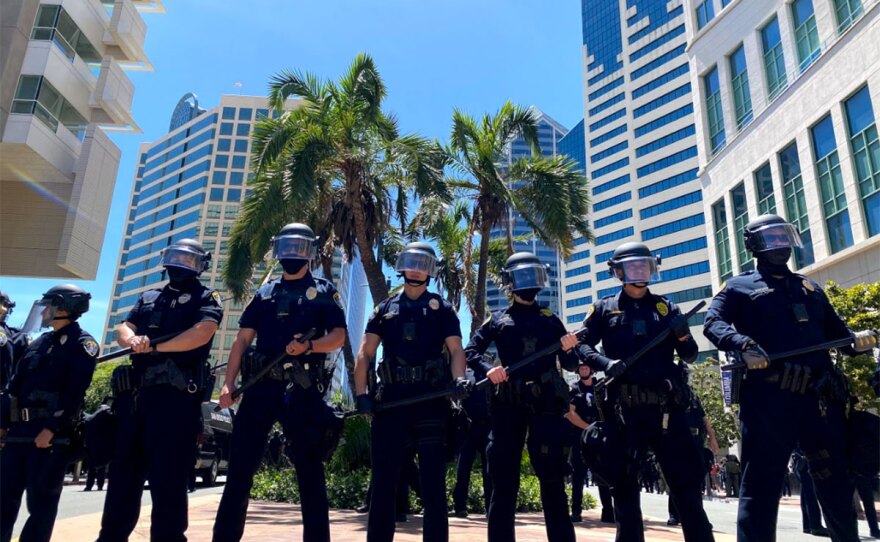Officers with the San Diego Police Department are now required to make de-escalating potentially violent encounters a high priority while on patrol, and must intervene if they witness another officer using excessive force, under new policies announced Wednesday by Mayor Kevin Faulconer and Police Chief David Nisleit.
The changes are the latest local reforms following the killing of George Floyd at the hands of Minneapolis police in May that sparked protests in San Diego and throughout the world against police violence.
In the face of this community outrage, local elected officials have rushed in recent weeks to change unpopular police tactics. Other examples include the banning of choke holds on suspects by all San Diego area law enforcement agencies, and moving toward the creation of a county mental health crisis unit that would respond to mental health calls instead of armed Sheriff's deputies.
RELATED: Search The Police Records Database
The SDPD policy changes came two weeks later than Faulconer originally promised. He said he needed time to work with the department as well as community groups, including the city’s Community Review Board on Police Practices and the Citizens Advisory Board on Police/Community Relations.
Avoiding force
The official new policy has not yet been made available. A spokesman for the mayor's office said it would be posted online in the next few days.
The centerpiece of the reforms is a standalone policy that requires officers to use de-escalation techniques, but only when they are deemed "safe, reasonable and based on the totality of circumstances," according to a description provided by the mayor's office.
The point is to avoid needing to use force, Faulconer said.
"Now the department has separate, expanded and standalone policies that don't just suggest de-escalation, they require it," he said.
De-escalation steps include creating a buffer zone between an officer and a subject to help reduce tensions and using specialized units, such as the Psychiatric Emergency Response Team, or PERT, clinicians. That county program has always been an option for police officers to call when dealing with a mental health crisis, but clinicians can sometimes not be readily available.
The policy will also direct officers to "take into consideration a subject's ability to understand and communicate effectively, present lawful orders, and request cooperation with clear and concise direction; and attempt to establish trust and cooperatively de-escalate situational conflict," according to the mayor's office.
But if the person does not follow the directions of the officer, then he or she can still use force.
The second change requires officers to step in if they see another officer using excessive force.
"This is a policy that will make sure what happened in Minneapolis doesn't happen here in San Diego," Faulconer said. "The actions of one officer can impact all officers. So if the actions of one officer go too far, every officer has a vested interest in making sure that it does not."
This "duty to intervene" policy requires the officer observing the excessive use of force to either tell the other officer to stop or physically restrain the other officer. The officer is also required to quickly report the intervention to a supervisor so an investigation can begin immediately.
If an officer fails to intervene, "appropriate disciplinary action, consistent with SDPD policy and applicable law, will be taken," according to the new policy.
Nisleit spoke highly of the policy and said the police union is on board.
"This new de-escalation policy is the most robust or one of the most robust in the country," he said.
RELATED: How A California Police Department Changed Its Mindset On Use Of Force
Other departments, including Berkeley and Baltimore, already have similar policies requiring police to attempt de-escalation first. Four years ago, Berkeley started a comprehensive training program with all its officers to bring de-escalation techniques into all aspects of policing, including the buffer zone tactic that San Diego will now use.
Berkeley is also now adding requirements that officers step in to stop excessive force.
Racial disparities
Faulconer and Nisleit did not address racial disparities in the SDPD’s use of force practices.
A KPBS analysis of nearly 130 use of force records from police departments dating back to 2001 shows that when local police use force on a suspect, if the suspect is a person of color they're more likely to shoot. If the suspect is white, police are more likely to use alternative methods of force, including Tasers, beanbags, police dogs or tackling the suspect.
RELATED: Records Show Racial Disparities When San Diego Law Enforcement Uses Force
A San Diego District Attorney’s Office study of officer-involved shootings between 1993 and 2017 also showed African American and Latino people are disproportionately shot by police compared to white people. African-American people have historically represented between 4.5% and 6% of San Diego County’s population, yet 17% of people shot by officers during the DA’s study period were African American, according to the report.
Community Advocate Khalid Alexander said a new policy is not enough. He wants to see the police department work to improve its relationship with communities of color.
"First acknowledge the harm you've done in the community and then maybe we can begin to have conversations with the community," he said. "The reason why they escalate things is because they always think everything they do is safe and reasonable. When they kill people with their guns."
Joining Faulconer and Nisleit at Wednesday’s new conference was Bishop William Benson with the Total Deliverance Worship Center. He said the changes are a good start but there is still more work to be done.
"Community, your voices have been heard," he said at the press conference announcing the new policies. "Community, we know you're asking for much more, and we know there's a lot of hard work that needs to go into this, but this has to be celebrated as going forward."
Chief Nisleit said officers would be trained on the new policies soon, but did not put a timeline on exactly when.
He noted that San Diego police officers are also receiving de-escalation training to comply with a new state requirement. However, District Attorney Summer Stephan said recently that only 700 officers out of 5,000 countywide have been trained so far.









